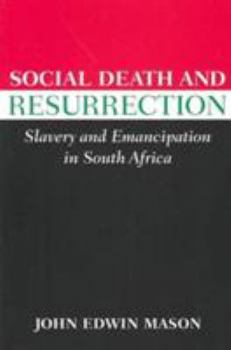Social Death and Resurrection: Slavery and Emancipation in South Africa
(Part of the Reconsiderations in Southern African History Series)
Select Format
Select Condition 
Book Overview
What was it like to be a slave in colonial South Africa? What difference did freedom make?
The questions themselves are simply put, but John Edwin Mason has found complex answers after delving deeply into the slaves' experience within the slaveholding patriarchal household, the work that slaves performed, the families they created, and the religions they practiced. Grounding his analysis within the context of South Africa's incorporation into the British Empire--primarily examining the period of 1820-50--Mason investigates a wealth of documentation from the British Colony of the Cape of Good Hope. Colonial officials, particularly the slave protectors, created and preserved a rich archive within which the voices of slaves and slaveholders, free blacks, and poor whites are recorded, and from which Mason presents vividly descriptive and telling accounts of slave life.
In Social Death and Resurrection Mason draws upon Harvard sociologist Orlando Patterson's theory that a slave's social degradation rendered him socially dead. "Social death" defined slavery in the ideal, slavery as it would have been had the slaves played along. But in colonial South Africa slaves did not play along: they fought the lash and resisted domination, retaining a cultural and moral community of their own. Mason investigates the subsequent "resurrection" of slaves following their successful struggle to preserve family, faith, community ties, and human dignity, despite their class domination and racial subjugation by slaveowners.
Although slavery officially came to an end with a series of reforms during a mid-nineteenth-century period of modernization and reform, the British colonial state's commitment to formal equality was in fact compatible with continued class domination. As a result, slaves did not entirely cease to be slaves, but through their own efforts and some governmental assistance, they achieved at least a partial victory over slavery's violence, marginalization, and degradation.
Reconsiderations in Southern African History





